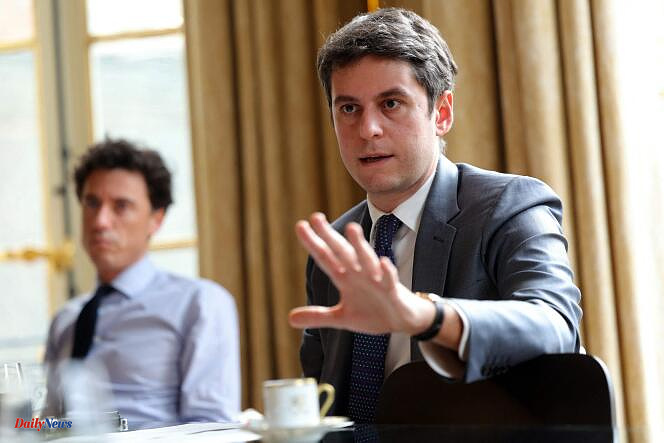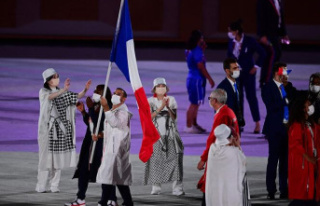Gabriel Attal considers secularism “more threatened than ever” in schools and promises the establishment of “pedagogical support units” to help teachers facing “resistance, even protests”, in an interview granted on Wednesday March 13, at Agence France-Presse (AFP).
“What worries me the most today is that we are seeing an increase in the number of reports for contesting teaching. I see in this both a sign that the enemies of secularism are still present and seeking to infiltrate the school and weaken it, but also “a sign that a word is being freed” among teachers, declares the head of government, two days before the twentieth anniversary of the law against the wearing of ostentatious religious outfits or symbols at school.
The “pedagogical support units” will, according to him, “be reachable directly by teachers who are concerned about a teaching sequence, who face resistance, or even challenges to their teaching”.
It will be “a contact at the level of the rectorate which can offer them three main solutions: educational support with reference teachers who can give them advice on tackling certain sequences of the program, a physical presence of non-teaching staff within the class, or the physical presence of trained staff, for example part of the “values of the Republic” academic teams.
Gabriel Attal, who banned, when he was Minister of National Education, the wearing of the abaya and the qami, Muslim outfits, welcomes "that today, reports for wearing signs and religious outfits [are] at their lowest.” “This is an unprecedented victory for secularism since 2004,” he underlines.
“The rule is the group” level
Gabriel Attal also persists in his very contested intention to set up level groups in French and mathematics in middle school, ensuring that they would be “the rule” in these subjects, and the entire class “the exception”. There will be “three groups according to the level of difficulty of the students, with one objective: that we can take stock of the level of the students, which will allow us to change groups,” he promises.
After weeks of consultations, the Minister of Education, Nicole Belloubet, who arrived at rue de Grenelle a month ago, announced last week a "certain flexibility" in the implementation, next year, in 6th and 5th, of these groups, supposed to raise the level of students. Preferring to describe them as “need groups”, she mentioned the possibility of “bringing students together as a whole class” at certain times, which relieved the teaching unions, who saw it as a change in this reform, to which they are strongly opposed. Gabriel Attal reaffirmed the next day that these would indeed be “level groups”.
“What does the name matter, as long as there is the measure,” he said in the interview with AFP, without specifying whether the expression “level group” would appear in the official texts which will be published on Friday to implement the “knowledge shock” – the set of measures decided to raise the level of students.
The head of government promises whole class time, but adds “that, for at least three quarters of the year, students must follow their lessons in French and mathematics in level groups. So the rule is the group, and the very limited exception is the class.
“It’s very annoying to see that Gabriel Attal remains firm on his decision to make the level group the rule,” reacted to AFP Sophie Vénétitay, general secretary of SNES-FSU, the main secondary school union (colleges and high schools). According to her, the Prime Minister “remains disconnected from the reality of what is happening in class and he has not taken into account at all the rejection of teachers and parents on this subject”.
For Jérôme Fournier, national secretary of SE-UNSA, “it is urgent to wait for the publication of the official texts”. “To say that the class is the exception is relative flexibility” and “we persist in thinking that groups are harmful for students,” he told AFP.
No differences with Nicole Belloubet
Teachers' and headteachers' unions fear a "sorting" of students and a lack of resources. Since January, mobilizations have taken place against this reform. Questioned on this subject, Gabriel Attal refutes any idea of "stigmatization" of students and judges that "the main concern of many parents" is rather "to know if the organization of the school will allow their children to progress".
Regarding resources, he assures that “if we realize, here or there, in such and such an academy, in such and such an establishment, that additional positions are necessary, we will continue to add resources.”
The Prime Minister also denies any “difference” with the Minister of Education on this subject. “Everyone knows how much we need to be united for our school. The direction is very clear. It was set by the President of the Republic. The roadmap is there. The school is, with Nicole Belloubet, in very good hands,” he assures. The Prime Minister adds that he does not want to take up education issues again, while this week he is increasing the number of trips, speeches and meetings devoted to school.
After a visit Monday to Arras, where teacher Dominique Bernard was killed five months ago, he will go Thursday to a college in Chartres (Eure-et-Loir) with the Minister of Education. He will host a videoconference meeting with the heads of establishments (middle schools, high schools), particularly on level groups. “I said on the day of my appointment to Matignon that I was taking the school’s cause with me,” he recalls. I never lost the thread. »












